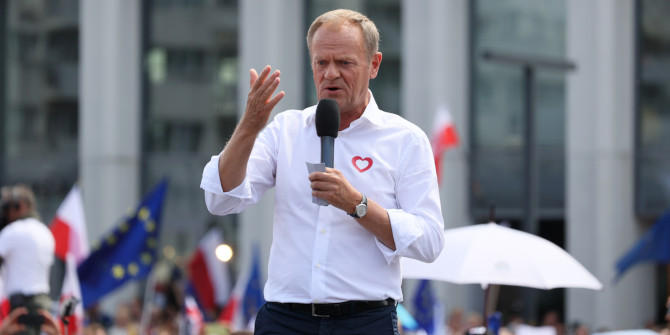Following a break over Christmas and New Year, coalition talks have resumed in the Netherlands. Antoaneta Dimitrova and Bernard Steunenberg assess the potential makeup of the country’s next government.
As the dust settled on the Dutch general election in November last year, most observers focused on the spectacular rise of Geert Wilders’ Party for Freedom (PVV) and the potential for this far-right party to form a government. With 37 seats in the new parliament, the PVV was the clear winner of the election. This was a sensational result for a party that has espoused anti-immigrant and anti-Muslim as well as anti-system and anti-parliamentary views.
Wilders and his associates have been critical of Dutch judges, portraying them as prejudiced and representing the interests of the liberal D66 party. Wilders also once described the Dutch parliament as a “fake parliament”. Ironically, one of the first successes of the PVV in the aftermath of the 2023 election was the appointment of Martin Bosma, a leading figure in the PVV, as Speaker of the House of Representatives.
Creeping crises
Wilders’ victory was achieved in the context of several creeping crises within Dutch society that the country’s mainstream parties have failed to address or have even exacerbated. The People’s Party for Freedom and Democracy (VVD) that had played a leading role in four different cabinets since 2010 under the leadership of Mark Rutte, implemented partial or quasi-solutions to a series of important structural problems during this period.
This “politics of postponement” ultimately led to a nitrogen emissions crisis, a housing crisis and migrant housing crisis, and a scandal over childcare benefits that led to the resignation of the government in 2021. The childcare benefits scandal saw parents wrongly accused of fraud and saddled with large debts after being forced by the tax authorities to pay back thousands of euros received in benefits. In many cases, parents subsequently slipped into poverty with some even having their children taken away by the authorities. The root cause of the scandal was an ethnic profiling algorithm that used factors such as family names and dual nationality status as indicators of potential fraud.
Rutte’s VVD consistently refused to take responsibility for these and other issues, such as earthquake damage from gas extraction around Groningen. These events damaged the public’s trust in Dutch political parties and institutions. In the 2023 election, the VVD received only 15.2% of the vote, down from 21.9% in 2021. The Christian Democrats (CDA), the VVD’s coalition partner, fared even worse, with just 3.3%. This partly reflected the decision to tackle the nitrogen emissions crisis by targeting farming emissions, generating a huge backlash among some of the CDA’s core supporters in rural areas.
New players
Wilders’ PVV was not the only party to benefit from these sentiments. Two new parties also emerged at the 2023 election: the Farmer–Citizen Movement (BBB) and the New Social Contract (NSC).
The Farmer-Citizen Movement, led by Caroline van der Plas, is an agrarian-based party with a social-conservative platform. As a vocal opponent of the Rutte IV cabinet’s plans to reduce nitrogen emissions, the party won a surprise victory in the Dutch provincial elections in March last year before winning 7 seats in the general election in November. Their electoral support was not confined solely to farmers, with voters who were dissatisfied with government policies in other areas also choosing to back the party.
The New Social Contract is led by a former CDA member, Pieter Omtzigt, known for his role in the parliamentary investigation into the childcare benefits scandal. The party has a centre-right profile with an emphasis on good governance and the economic position of the middle classes. At one stage, the party was projected to win the general election, but potentially due to Omtzigt’s hesitancy over taking on the role of Prime Minister, the NSC ultimately secured just under 13% of the vote. This nevertheless remained a strong showing for a party established just a few months before.
Surprisingly, unlike other new parties that have emerged on the extremes of the political spectrum, the BBB and NSC both target centrist voters, especially those who have left the CDA. This partly reflects the failure of the CDA to keep up with transformations in Dutch society and remain close to its rural voters.
Coalition negotiations
As the largest party, the PVV has taken the lead in coalition negotiations. One potential option is a coalition that brings together the PVV, BBB, NSC and possibly the VVD. However, a major obstacle to such an agreement is opposition to Wilders’ previously declared positions regarding Muslim schools, migrants and European integration, many of which have been criticised for being unconstitutional or violating the rule of law. To counter these concerns, Wilders has made initial promises to maintain the Constitution, respect important civil liberties such as freedom of religion and protect the independence of the judiciary.
Another obstacle is that the far-right PVV is not a classical political party with a membership and clear organisational rules to structure decision-making. It functions more as a group of like-minded political representatives, dominated by Wilders. This structure creates problems for the formation of a government as the party will need to mobilise sufficiently qualified members for the cabinet.
Yet even if an agreement can be reached, it is questionable whether such a government will be capable of responding to the issues voters care most about. Both Wilders and Omtzigt have made their political careers as disruptors – they may have great difficulty in turning their success in disruptive politics into a policy programme that can address the current structural crises facing the Netherlands.
Note: This article gives the views of the authors, not the position of EUROPP – European Politics and Policy or the London School of Economics. Featured image credit: Robert Hoetink / Shutterstock.com




